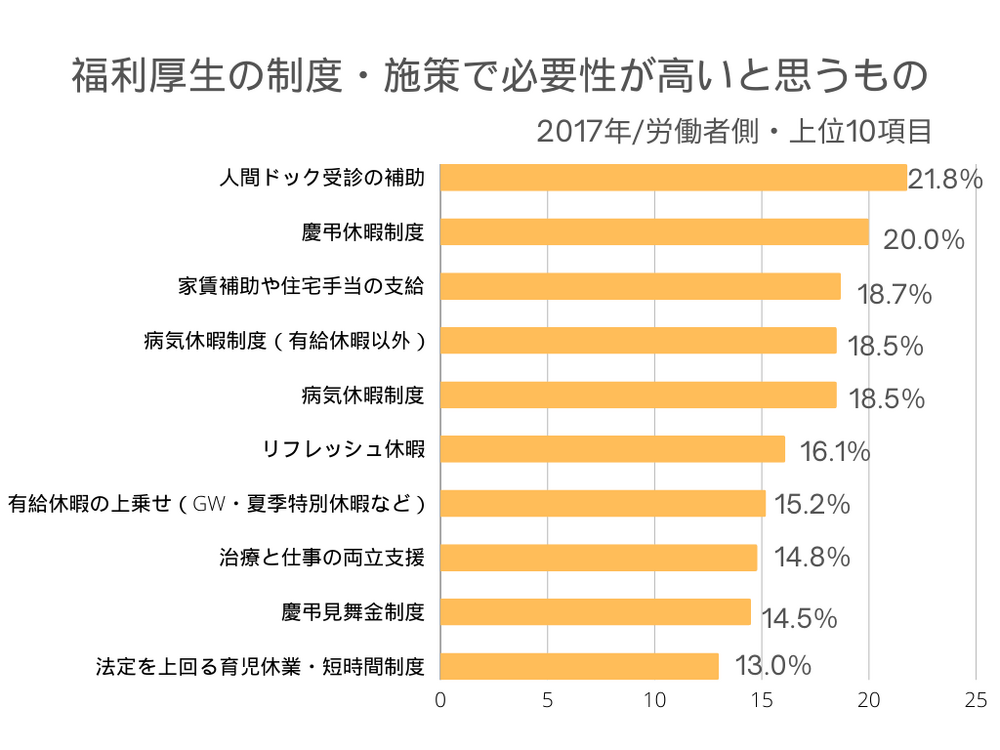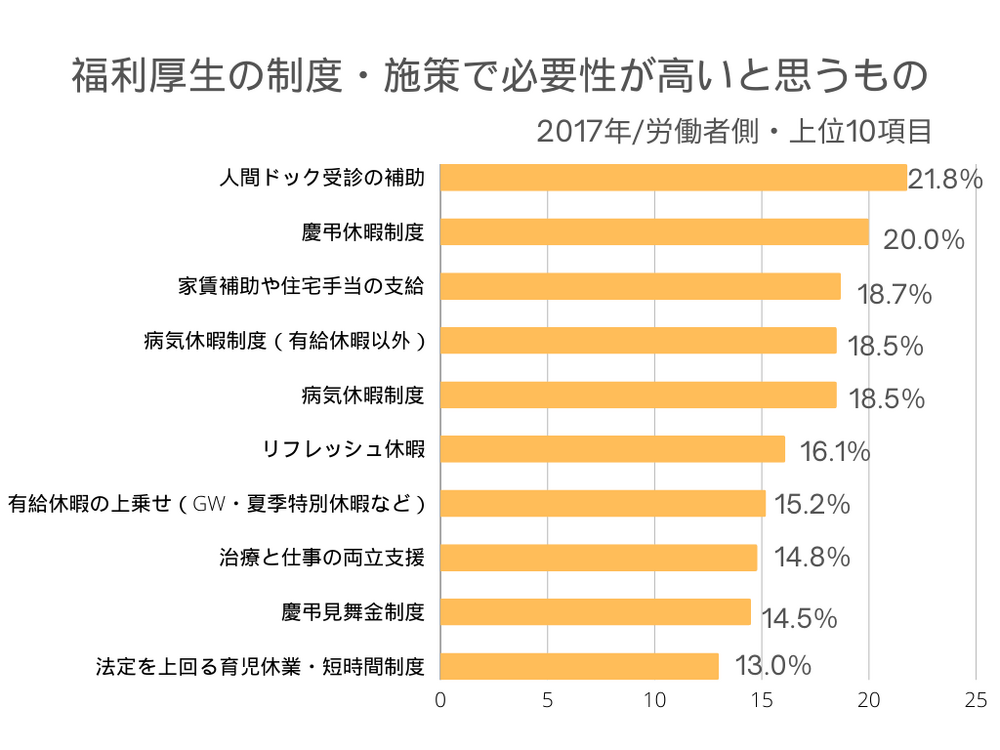外資系企業は退職金や住宅手当がないなど、日系企業に比べて福利厚生が良くないイメージを持っている人が多いようですが、実際はどうなのでしょうか?
本記事では、外資系企業の福利厚生に対する考え方や、外資系企業にある福利厚生について徹底的に解説します。ぜひ参考にしてください!

外資系企業は退職金や住宅手当がないなど、日系企業に比べて福利厚生が良くないイメージを持っている人が多いようですが、実際はどうなのでしょうか?
本記事では、外資系企業の福利厚生に対する考え方や、外資系企業にある福利厚生について徹底的に解説します。ぜひ参考にしてください!
Many people have the image that foreign-capital companies do not offer good benefits compared to Japanese companies, such as retirement benefits and no housing allowance.
In this article, we will thoroughly explain the concept of benefits at foreign-affiliated companies and the benefits available at foreign-affiliated companies. We hope you will find it useful!
退職金や住宅手当などの福利厚生がない外資系企業は、日系企業と比較して見劣りがしてしまいます。しかしこれらの福利厚生が外資系企業にないのは、日系企業と異なる特徴があるからです。その理由について説明します。
日系企業は、新卒で入社した会社に定年まで勤めあげる「終身雇用」が大きな特徴です。優秀な人材を確保・定着させることを目的に、福利厚生の充実に取り組んでいます。
日系企業は住宅手当や人間ドック費用補助などで、従業員やその家族の生活や健康の安定性を図ったり、社内食堂の設置など職場環境を整えたりすることで、従業員の満足度を上げています。退職金は、会社に長年貢献してきた従業員に対しての慰労金の意味合いを持ち、「社員の一生をサポートする」日系企業の意識の表れです。
また従業員にとって充実した福利厚生は、「この企業で働けば安定した生活が送れるかどうか」の一つの判断要素となっています。
多くの日系企業は、従業員に長期間にわたって貢献してもらうことを目指しているため、充実した福利厚生を用いて働きやすい環境を提供しているのです。
外資系企業には終身雇用という概念がなく、転職してキャリアアップするのが一般的です。
従業員は数年で転職することが予想されるので、「スキルアップや自己啓発の支援」や「ワークライフバランスの維持」の福利厚生を提供する傾向にあります。
一部の外資系企業ではサバティカル休暇やボランティア休暇を導入して、社員のキャリアの見直しや新たなスキルの習得、ワークライフバランスの確保に努めていたり、スキルアップのための書籍購入費を負担したりしています。
実力主義が根付いている外資系企業では、ライフスタイルやキャリアの発展を支援する福利厚生が提供されているのです。
転職して在籍期間が短い外資系企業では、日系企業のような退職金や住宅手当のような福利厚生をほとんど見かけません。日系企業が退職金として積み立てている資金を、外資系企業は給料に上乗せして支払っています。諸手当を給料に含むために、外資系企業の給料が高くなっているのです。使い道が限定されていない分、融通の利くお金の使い方ができるとも言えます。
Foreign-affiliated companies that do not offer benefits such as retirement and housing allowances may be inferior to Japanese-affiliated companies. However, the reason why these benefits are not available in foreign-affiliated companies is because they are different from those offered by Japanese-affiliated companies. The reasons for this are explained below.
A major characteristic of Japanese-affiliated companies is “lifetime employment,” in which employees work for the company they joined after graduation until retirement. With the aim of attracting and retaining talented employees, they are working to enhance their benefit packages.
Japanese-affiliated companies are increasing employee satisfaction by providing housing allowances and subsidies for physical examinations to ensure stability in the lives and health of employees and their families, and by creating a better work environment, including the establishment of in-house cafeterias. Retirement benefits are meant as a consolation payment to employees who have contributed to the company over the years, and are an expression of Japanese companies' awareness of “supporting employees for the rest of their lives.
For employees, a full range of benefits is one of the factors that determine whether or not they can enjoy a stable life if they work for this company.
Many Japanese-affiliated firms aim to have their employees contribute over the long term, so they provide a good working environment with a full range of benefits.
Foreign-affiliated companies do not have the concept of lifetime employment, and it is common for employees to change jobs and advance their careers.
Since employees are expected to change jobs after a few years, they tend to offer benefits that “support skill development and personal growth” and “maintain work-life balance.
Some foreign-affiliated firms have introduced sabbatical leave or volunteer leave to help employees review their careers, acquire new skills, and maintain a work-life balance, or they pay for the purchase of books to improve their skills.
Foreign-capital companies, where meritocracy is deeply rooted, offer benefits that support lifestyle and career development.
In foreign-affiliated companies where you change jobs and have a short tenure, you will rarely see benefits such as retirement and housing allowances like those offered by Japanese-affiliated companies. The funds that Japanese companies accumulate as retirement allowances are added to salaries at foreign-affiliated firms. The salaries of foreign-affiliated firms are higher because the benefits are included in the salary. The fact that the use of the money is not limited also allows for more flexibility in the use of the money.

福利厚生には「法定福利厚生」と「法定外福利厚生」の2種類があります。福利厚生の考え方が異なる外資系企業でも、日本の法律で「法定福利厚生」を設けなくてはなりません。「法定福利厚生」「法定外福利厚生」について見ていきましょう。
法定福利厚生とは、法律で会社が実施を義務付けられている福利厚生をいいます。法定福利厚生には以下の6つの種類があります。
健康保険 | 従業員のケガや病気など万が一に備える保険 |
厚生年金保険 | 従業員の老後資金を蓄える、また高度障害時に備える保険 |
介護保険 | 40歳から加入、介護にかかる費用負担を軽減するための保険 |
雇用保険 | 失業や休業、転職活動中に生活が困窮しないよう設けられた保険 |
労災保険 | 従業員が労働中・通勤中にケガをしたとき、労働によって発病したときに備える保険 |
子供・子育て拠出金 | 育児費用の負担を減らし、次世代の育成を促進するために設けられている制度 |
外資系企業であっても法定福利厚生を設けない企業は法律違反となり、罰せられます。
法定外福利厚生は、法律で実施が義務付けられていない福利厚生です。企業が任意で設定・導入するので、企業によって違いがあります。
法定外福利厚生の内容としては、以下のようなものがあります。
外資系企業は法定外福利厚生を設けないか、最低限のレベルのものにして、代わりに年俸を高水準に設定するケースが多く見られます。

There are two types of benefits: “statutory benefits” and “non-statutory benefits. Even foreign companies, which have a different approach to benefits, are required by Japanese law to provide “statutory benefits. Let's take a look at “statutory” and “non-statutory” benefits.
Statutory benefits are benefits that a company is required by law to provide. There are six types of statutory benefits
| Health Insurance | Insurance for employee injuries, illnesses, and other emergencies |
| Employee Pension Insurance | Insurance for employees to save for their retirement or in case of severe disability. |
| Long-term care insurance | Insurance to reduce the cost burden of nursing care for the elderly from the age of 40. |
| Unemployment insurance | Insurance designed to protect employees from unemployment, leave of absence, and job loss. |
| Workers' accident compensation insurance | Insurance for employees who are injured while working or commuting to and from work, or who become ill as a result of their work. |
| Child and child care contribution | A system designed to reduce the cost of childcare and promote the development of the next generation. |
Companies that do not provide legal benefits, even for foreign companies, are in violation of the law and will be penalized.
Non-statutory benefits are benefits that are not required by law to be implemented. They are set up and introduced by companies on a voluntary basis and vary from company to company.
Non-statutory benefits include the following
In many cases, foreign-affiliated companies do not provide non-statutory benefits or provide a minimal level of benefits, and instead set the annual salary at a higher level.
独立行政法人労働政策研究・研修機構が2017年に実施した調査によると、従業員が望む福利厚生は以下の通りでした。

調査期間:2017年10月28日~12月20日、調査人数:8,298人
参考:独立行政法人労働政策研究・研修機構「企業における福利厚生施策の実態に関する調査-企業/従業員アンケート調査結果-P52」
「休暇制度」に関しては、10位以内に慶弔休暇制度・病気休暇制度(有給休暇以外)・病気休暇制度・リフレッシュ休暇制度・有給休暇の上乗せ・法定を上回る育児休業制度の6項目が入っていました。
このことから従業員が本当に望んでいる福利厚生は「休暇制度」だといえるでしょう。外資系企業はワークライフバランスを維持する目的の福利厚生が多いため、休暇制度も充実しています。
According to a 2017 survey conducted by the National Institute for Labor Policy and Training (NILPT), the following benefits were desired by employees

Survey period: October 28-December 20, 2017; number of persons surveyed: 8,298
Reference: “Survey on the Actual Status of Welfare Policies in Companies - Results of Company/Employee Questionnaire Survey - P52,” by the Japan Institute for Labour Policy and Training (JILPT)
The top 10 most popular leave systems were: congratulatory or condolence leave system, sick leave system (other than paid leave), sick leave system, refreshment leave system, additional paid leave, and childcare leave system that exceeds the legal limit.
This suggests that the benefit that employees really want is a “leave system. Since many foreign-affiliated companies offer benefits aimed at maintaining work-life balance, their leave systems are also well-developed.

外資系企業は日系企業と比較して、ワークライフバランスを向上させる福利厚生が整っています。
ここでは以下の3つをご紹介します。
外資系企業には、有給休暇のほかにも福利厚生として様々な休暇制度があります。企業によって付帯される休暇は異なりますが、以下のようなものが代表的な休暇です。
休暇があるだけでなく、取得しやすいのが外資系企業の特徴です。自分の仕事で成果を出していれば有給休暇を含め、これらの休暇は申請するだけで取れる環境となっています。
成果を出していれば働く場所は自由なのが、外資系企業の特徴です。子供が小さいうちは保育園に預けながらフルリモートを活用して、保育園の送迎時間の慌ただしさや急な子供の体調不良に対応している人もいます。
ただし全社員に対応しているわけではありません。仕事の性質を考慮して、生産性が上がるなどプラス面がある場合に運用されます。
そのため職種や、転職したばかり、直属の上司の考え方によってはフルリモートが活用されないケースもあります。転職する際には条件をよく確認するようにしましょう。
外資系企業はフレックスタイムを導入している企業が多くあります。自分の仕事は自分でマネジメントしているので、労働時間に関しても自分でコントロールできるのです。
フレックス勤務は、すべての従業員が出社しなければならないコアタイムと、コアタイムの前後で自由に出社・退勤時間を決められるフレキシブルタイムに分かれています。病院に行ってから出社するなど、プライベートとの両立が可能です。
最近ではコアタイムが一切ない「スーパーフレックス制度」を導入する外資系企業も増えてきています。

Compared to their Japanese counterparts, foreign-affiliated firms offer benefits that improve work-life balance.
Here are three examples
In addition to paid leave, foreign-affiliated companies offer a variety of other leave programs as part of their benefits package. Although the types of leave offered vary from company to company, the following are typical leaves of absence.
Not only are vacations available, but they are easy to take at foreign-affiliated companies. The environment is such that you can take these leaves, including paid leave, simply by applying for them, as long as you produce results in your own work.
A characteristic of foreign-affiliated companies is that you are free to work wherever you want as long as you are producing results. Some employees utilize full remote while leaving their children at daycare while they are young, to cope with hectic daycare pick-up and drop-off times or sudden illnesses of their children.
However, this is not the case for all employees. It is operated when there is a positive aspect, such as increased productivity, considering the nature of the job.
Therefore, depending on the type of job, if you have just changed jobs, or your immediate supervisor's way of thinking, there may be cases where a full remote system is not utilized. When changing jobs, be sure to check the conditions carefully.
Many foreign-affiliated companies have introduced flextime. Since you manage your own work, you have control over your working hours as well.
Flexible working hours are divided into core hours, during which all employees must come to work, and flexible hours, during which employees are free to come and go before or after core hours. This allows employees to balance work with their personal lives, such as going to the hospital before coming to work.
Recently, an increasing number of foreign-affiliated companies have introduced a “super-flex system” in which there is no core time at all.
ほとんどの外資系企業に福利厚生としての退職金がありません。しかし以下のような福利厚生を用意して、退職金をカバーしている企業もあります。
RSUは金銭面で大きなメリットをもたらす福利厚生です。従業員が「一定期間の継続勤務」などの企業が設けた条件を達成した際に、その会社の株式を無償で付与される制度です。
例えば入社時に入社以後3年勤続すれば、給与・賞与のほかに自社株300株を3年に分けて支給するという雇用契約にサインしたとします。すると入社から1年目に100株、2年目に100株、3年目に残りの100株を受け取れます。この時、株価が変動していても問題なく約束の株数を受け取れるのです。
このためRSUは従業員にとって確実に受け取れる、メリットの大きな福利厚生となっています。
将来退職金代わりとして受け取る資金として、企業型確定拠出年金を導入する外資系企業が増えてきています。
企業が毎月決められた掛金を積み立て、従業員は企業が提携しているファンドから運用先を自分で選定し運用します。運用されたお金は定年を迎えるころに年金として受け取れるので、退職金代わりになるのです。
企業型確定拠出年金は掛け金が個人資産として登録されているので、会社が倒産しても全額保全されますし、転職してもそのまま運用できるメリットがあります。
社会保険料は企業と従業員がそれぞれ負担するのが通常ですが、外資系企業の中には全額負担してくれる企業があります。その結果、手取り金額が増えるのです。
この場合、退職金のように将来受け取れるお金ではありませんが、金銭的メリットが大きく、自身で運用を行うなどして将来に備えられます。
Most foreign-owned companies do not offer retirement benefits as a benefit. However, some companies offer the following benefits to cover retirement costs
RSUs are benefits that offer significant financial advantages. When an employee achieves conditions set by the company, such as “a certain period of continuous service,” he or she is granted shares of the company's stock free of charge.
For example, suppose an employee signs an employment contract that provides 300 shares of the company's stock in addition to salary and bonus if he or she continues to work for the company for three years after joining the company. The employee would receive 100 shares in the first year, 100 shares in the second year, and the remaining 100 shares in the third year. At this time, the employee will receive the number of shares promised, even if the stock price fluctuates.
This makes RSUs a highly beneficial benefit that employees are sure to receive.
An increasing number of foreign-affiliated companies are introducing defined contribution company pension plans as a substitute for future retirement benefits.
The company sets aside a set monthly contribution, and the employee selects and manages his or her own investment from funds that the company has partnered with. The invested money is received as a pension when the employee reaches retirement age, and can be used as a substitute for retirement benefits.
The advantage of a company defined contribution pension plan is that the premiums are registered as personal assets, so even if the company goes bankrupt, the full amount is protected, and the money can be invested as is even if the employee changes jobs.
Although social insurance premiums are usually paid by both the company and the employee, some foreign-affiliated companies pay the full amount. As a result, the amount of take-home pay increases.
In this case, although the money is not the same as retirement benefits, the financial benefits are significant, and the employee can prepare for the future by investing the money himself/herself.
外資系企業は、自らスキルアップするために学習する人を好みます。そのため次のような福利厚生で社員をサポートしています。
外資系企業は、自己啓発に力を入れている企業が多くあります。その一環として、書籍を購入した代金を企業が支払ってくれる福利厚生があります。
書籍購入代金の上限を、月や年単位で決めているのが一般的です。金銭的な負担が減るため高額な専門書なども手に入りやすくなり、スキルアップに繋がります。
外資系企業で必要になるのが英会話です。英語力向上のために、英会話レッスンなどをサポートする福利厚生を提供する外資系企業も多くあります。
英会話レッスンは、2つのタイプがあります。
英会話レッスンのほかにも、TOEIC受験費用や英会話アプリ購入代金を企業が負担するなどもあります。
業務に必要な資格の取得を外資系企業がサポートするのが、資格取得支援制度です。
サポート方法は主に3つあります。
資格取得には高額な費用がかかるケースが多いので、企業が負担することにより受講のハードルが下がるなど、資格取得のきっかけになります。
Foreign-affiliated companies prefer people who learn to improve their skills on their own. That is why we support our employees with the following benefits
Many foreign-affiliated companies are committed to self-development. As part of this effort, there are benefits programs that allow companies to pay for the purchase of books.
Generally, the maximum amount of money for book purchases is set on a monthly or yearly basis. This reduces the financial burden and makes it easier to obtain expensive technical books and other materials, which helps to improve skills.
English conversation is a necessity at foreign-affiliated companies. Many foreign-affiliated companies offer benefits that support English conversation lessons to improve English skills.
There are two types of English conversation lessons.
In addition to English conversation lessons, companies may also pay for TOEIC exam fees or English conversation app purchases.
The Qualification Acquisition Support System supports foreign companies in acquiring qualifications necessary for their work.
There are three main support methods.
Since many qualifications are expensive to obtain, companies provide support to lower the hurdle to obtaining them, thereby providing an opportunity to obtain qualifications.
ほかにも外資系企業ならではのユニークな福利厚生がありますので、3つご紹介いたします。
多くの外資系企業で実施されているのが、ドリンクやスナックを無料提供する福利厚生です。
パテントリーなどにコーヒーや紅茶、スナックが置かれており、社員は自由に飲めるようになっています。お土産のお菓子などを置く人もいるので、社員の憩いの場にもなります。
ベビーシッターサポートは、社員の仕事と子育ての両立をサポートするための制度です。
子供がある一定の年齢になるまで、ベビーシッターを利用する際の金額補助をするものです。この制度を活用することで子供の保育園への送迎時間を気にせずに働けるなど、仕事に集中できる環境が整いパフォーマンスが上がるので、社員にも企業にもメリットがあります。
チームの生産性を向上させることを目的とした「チームビルディング」費用があるのも外資系企業の特徴です。
チームビルディング費用は、コミュニケーションの促進を促すために、ランチ会や親睦会などを開催するための費用です。日系企業だと親睦会などは従業員もお金を払うことがありますが、外資系企業はチームビルディング費用で賄ってくれます。
人間関係がドライだと思われがちな外資系企業ですが、従業員同士のコミュニケーションを促進し、よいチームワークを育む機会を提供してくれるのです。
There are three other unique benefits that only a foreign-affiliated company can offer.
Many foreign-affiliated companies offer a benefit program that provides free drinks and snacks.
Coffee, tea, and snacks are placed in patenries and other locations, and employees are free to drink them. Some people also place souvenir snacks and other items, making it a place for employees to relax.
Babysitter Support is a program designed to help employees balance work and child-rearing.
The program provides financial assistance for the use of babysitters until the children reach a certain age. This system is beneficial to both employees and the company, as it allows employees to work without worrying about the time required to take their children to and from daycare, creating an environment in which they can concentrate on their work and improve their performance.
The program is beneficial to both employees and the company.
Another feature of foreign companies is “team building” expenses aimed at improving team productivity.
Team building expenses are for holding lunch meetings, social gatherings, and other events to promote communication. In Japanese companies, employees may also pay for social gatherings, etc., but in foreign-affiliated companies, the team-building expenses cover the costs.
Although foreign-affiliated companies are often thought to be dry in terms of human relations, they provide opportunities to promote communication among employees and foster good teamwork.

外資系企業の福利厚生は以下の3つの方法で調べられます。
外資系企業に強い転職エージェントの活用は、外資系企業への転職を考える際におすすめの方法です。転職エージェントは希望の企業を紹介してくれるだけでなく、企業の福利厚生やポジションの細かい情報、また求職者に代わって質問をしてくれます。
求人票は、導入している福利厚生をすべて記載しているわけではありません。詳しい情報を知りたい場合は、外資系企業に強い転職エージェントを活用しましょう。ユナイテッドワールドなら、あなた専任のキャリアカウンセラーが企業とコンタクトを取り、しっかりとあなたの疑問にお答えします。
企業のホームページの中にあるキャリアサイトには、その企業の福利厚生の情報が載っています。優秀な人材を惹きつけるために、福利厚生だけでなく働きやすさのアピールもしているので、確認してみるとよいでしょう。
口コミサイトやSNSで、企業の評判を参考にする方法があります。月間残業時間や有給消化率などの具体的な数字や、「ワークライフバランス」「退職理由」など様々な項目に対して社員や元社員からの生の声が書かれています。福利厚生についても書かれていることもあるので、参考になるでしょう。
ただし情報が古いケースもあるので、注意が必要です。

There are three ways to find out about benefits at a foreign company
Using a recruitment agent that specializes in working with foreign-affiliated companies is recommended when considering a career change to a foreign-affiliated company. Not only can a recruitment agent introduce you to the company of your choice, but they can also provide detailed information on the company's benefits package and position, as well as ask questions on your behalf.
Job postings do not always list all of the benefits offered. If you want detailed information, use a recruitment agency that is strong in foreign companies. With United World, your dedicated career counselor will contact the company and make sure all your questions are answered.
The career site within a company's website contains information about the company's benefits. In order to attract the best talent, it is a good idea to check out the company's benefits as well as the ease of working there.
There are ways to refer to a company's reputation through word-of-mouth websites and social networking sites. You can find specific figures such as monthly overtime hours and paid vacation rate, as well as real voices from employees and former employees on various items such as “work-life balance” and “reasons for leaving”. Sometimes, information on benefits is also included, which may be helpful.
However, please note that in some cases the information may be out of date.

外資系企業の福利厚生は、日系企業とは異なり「スキルアップや自己啓発」「ワークライフバランスの重視」に重きを置いています。給与やワークライフバランスなどトータルで考えると、あなたにとって今よりもよい条件の外資系企業が見つかるかもしれません。
あなたに合う企業、求めている働き方を1人で探すのは、時間もかかり難しいものです。そのような場合はぜひ、ユナイテッドワールドにお任せください!数ある求人の中から、あなたにピッタリの企業をご紹介し、転職に成功するまであなたをしっかりサポートしていきます!

Unlike Japanese-affiliated companies, foreign-capital companies' benefit packages emphasize “skill improvement and self-development” and “emphasis on work-life balance. If you consider the total package, including salary and work-life balance, you may be able to find a foreign company with better conditions for you than you have now.
It can be time-consuming and difficult to find a company that suits you and the way you want to work alone. In such a case, please leave it to United World! We will introduce you to companies that are a perfect fit for you and support you until you successfully change jobs!
